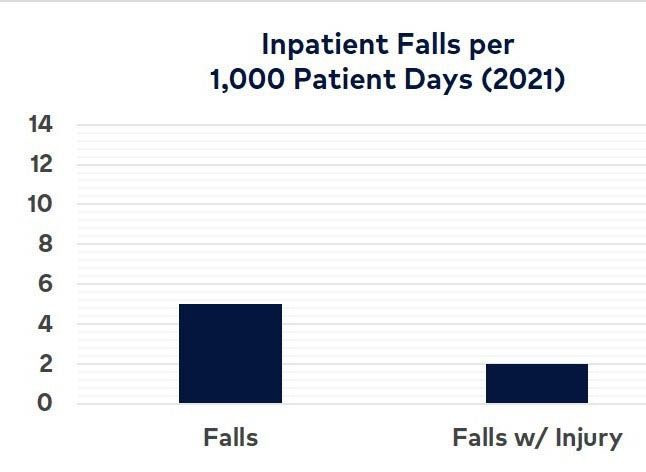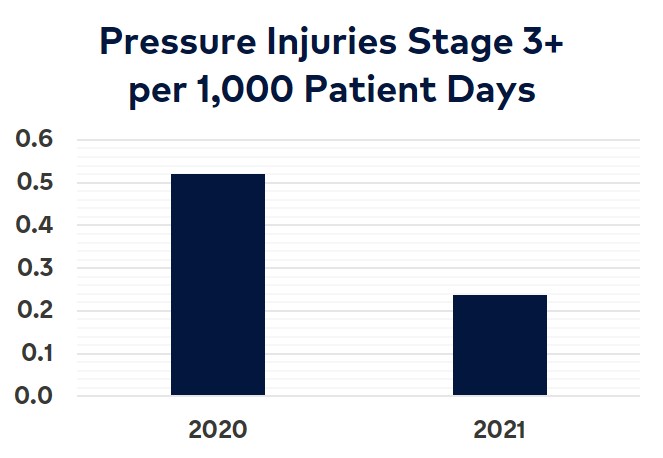Hospitals have adopted “evidence-based” practices, which are strategies proven to yield the best patient care outcomes and also reduce medical complications. Our measures reflect a comprehensive approach to ensure patients receive the best care in the safest environment. Practices include:
- Hand hygiene
- Infection control practices
- Prevention of complications while patients are using a ventilator
- Prevention actions for patients who are at risk of falls
- Prevention actions to avoid bed sores
- Prevention actions to assure surgical safety
- Staff reporting
We are constantly striving to improve care and services. Some of the goals and strategies that are currently in place include, but are not be limited to:
- Reduce hospital readmission
- Better coordination of care between community care agencies
- Increased patient education and management over chronic diseases
- Consistently using best clinical practices in high risk populations such as those diagnosed with Chronic Obstructive Pulmonary Disease (COPD) and Congestive Heart Failure (CHF)
- Improve ability to treat and care for patients who require Geropsychiatry services.
- Incorporate best practices in monitoring of physical safety while in our care
- Improve patient hospital experience satisfaction
- Incorporate into the performance evaluation system staff engagement in patient satisfaction and patient safety
Frisbie Memorial Hospital 2022 quality update
As of June 2022, Frisbie Memorial Hospital’s Safety Performance:
- Maintained Joint Commission Accreditation
- Hospital Compare Quality: 4 Stars
- Leapfrog A Score
Frisbie Memorial Hospital is highly committed to delivering safe and high-quality care to every patient. This year, Frisbie Memorial Hospital’s efforts to improve quality and safety include, but are not limited to:
- Implemented tele-infectious disease and tele-neurology to ensure timely and evidence-based specialty physician care;
- Remain up-to-date with CDC recommendations regarding how to detect and prevent the spread of COVID–19 and other infections resulting in over 1 year without a hospital-acquired Clostridium Difficile (C. diff) or Catheter-Associated Urinary Tract Infection (CAUTI);
- Purchased new safety equipment to reduce patient falls;
- Reduced pressure injuries through daily wound care nurse rounds and evidence-based nursing care
- Executive Leader Patient Safety Rounds, Leadership Safety Huddles, Nurse Leader patient rounds.
Resources for fall and pressure injury prevention

Visit the CDC website for more information on preventing falls in the community.
Information on pressure injuries and prevention
To learn more about our quality data performance, please review one of the following:
Falls and pressure injuries
Lower scores are better
Falls are a common adverse event among hospitalized patients. Those that result in injury may increase a patient's length of stay, could result in complications, or even death.
Falls and related injuries reflect the quality of nursing care. Frisbie Memorial Hospital is committed to preventing patient falls and associated injuries. Over the past year we have implemented new beds and nursing call bell systems to help reduce patient falls. We report the rate of patients who are injured due to a slip or fall while in the hospital (per 1,000 patient days).
Pressure injuries, also known as pressure ulcers, bedsores or decubitus ulcers, is skin breakdown that occurs because of prolonged pressure over bony prominences or under medical devices. This injury can be common in patients who are not able to turn or reposition in the bed or chair, refuse to be repositioned, are underweight, or if they experience a long procedure that is more than 4 hours.
Frisbie Memorial Hospital is committed to preventing hospital-acquired pressure injuries. Over the past year we have strengthened timely skin assessments within the emergency department and inpatient units and routinely assess nutrition needs. We report the rate of inpatients that experience a Stage III or higher pressure injury while in the hospital (per 1,000 patient days).
Frisbie Memorial Hospital is committed to preventing hospital-acquired pressure injuries. Over the past year we have strengthened timely skin assessments within the emergency department and inpatient units and routinely assess nutrition needs. We report the rate of inpatients that experience a Stage III or higher pressure injury while in the hospital (per 1,000 patient days).

Frisbie Memorial Hospital’s Falls Per 1000 Patient Days. Overall 5 falls per 1000 patient days and 2 falls with injury per 1000 patient days. Lower numbers are better.

Frisbie Memorial Hospital’s Pressure Injuries per 1000 Patient Days that are stage 3 or stage 4. 2020 approximately 0.5 stage 3 or 4 pressure injuries reduced to approximately 0.2 in 2021.